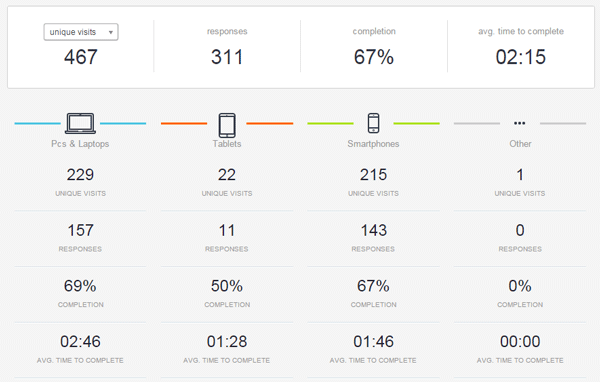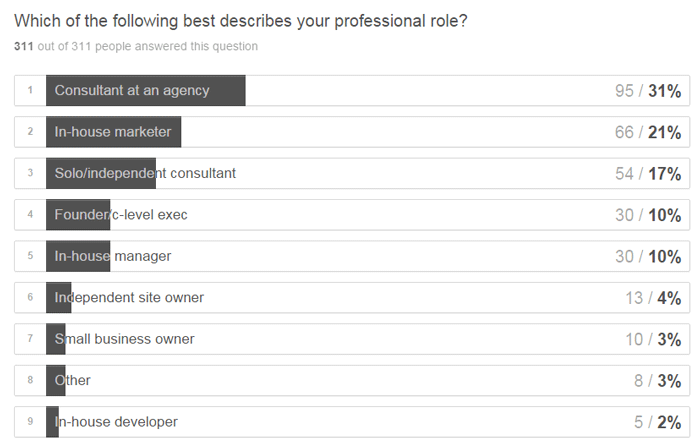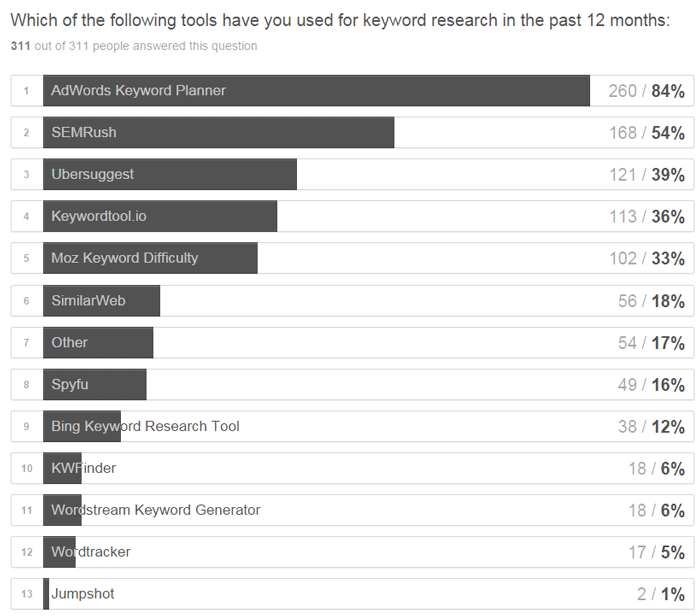In 2015, I’ve been pretty obsessed with keyword research and the tools web marketers are using to do it. I’ve made no secret of the fact that I’m working with Russ Jones (after our SERPscape acquisition) and a small team at Moz to build something in this space (and it’s now live! Moz’s new keyword research tool, Keyword Explorer). But, I’m always trying to learn more and, in that spirit, after some nudging to try using Typeform again (which is pretty damn great survey software, BTW), I put up a short survey asking for thoughts around keyword research tools.

With 300+ responses, I think we’ve got enough data to be directionally accurate about the state of the KW research tools world. Let’s dig in.
First, a look at who answered the questions:

There were only two calls to action for this survey – one via my Twitter account and the other via my Google+ page. I didn’t reach out directly to folks or try to solicit via Moz’s marketing channels (paid or organic), so the sample of survey takers is definitely biased toward those who follow me personally on social channels. That said, this breakdown suggests fairly good coverage of web marketers, both consultants and in-house. We’re likely not looking at huge error bars for, at least, the top 3 groups above.
Next up is the juicy bit – a look at which tools are being used for keyword research today:

If I were to guess, prior to this survey, my instincts would have been to place money on Keyword Planner and SEMRush, the two behemoths of the keyword research world. The results back that up, though several additional points were interesting to me:
- Ubersuggest and Keywordtool.io are neck and neck, despite the latter’s much more recent entry into the field (the first I heard of Keywordtool.io was at the start of 2014, while Ubersuggest’s been around since at least 2011).
- Moz’s Keyword Difficulty Tool only offers a single function in the KW research process (showing the relative competition level for a term/phrase), but is still relatively popular. Either that particular challenge garners a lot of interest or there’s bias since folks who took this survey are more likely to be Moz subscribers because of how it was promoted.
- In spite of its relatively high price point (starting at $199/month), Similarweb has serious penetration in the market. IMO, this is due to their unique data source (clickstream data that’s not filtered in any way by Google or other search engines).
- I expected Wordstream to have more market share, especially with the free version of their tool. I’m not sure if this is due to the bias of my social audience (to SEO vs. PPC, where Wordstream operates) or if it’s because Wordstream’s target customer (generally more enterprise than SMB).
- Some of the tools that come up in the “Other” field were new to me, while others I simply hadn’t thought of from a keyword research perspective. Those mentioned at least twice included:
- Google Search Console aka Webmaster Tools
- Hubspot’s Keyword Tool (I wasn’t familiar with this feature of Hubspot, but it looks to be powered by SEMRush or a similar service)
- Google Suggest
- Google Related Searches
- Searchmetrics Keyword Tool (part of their suite)
- Keywords Everywhere for Chrome & Firefox (a browser plugin that shows KW volume & CPC alongside keywords in many other tools)
- TermExplorer (a tool I haven’t tried out)
As with much of the SEO tools landscape, there’s a long tail. Another 20 disparate tools and sources were listed once by those who filled in the “other” field.
Regarding paid vs. free usage, the split wasn’t too surprising:

That suggests, to me, that a small but substantive portion of the use of tools like SEMRush and Keywordtool.io are only using the free features. But, overall, web marketers are paying for keyword research tools at a nearly 2:1 ratio. It makes sense – you’d be crazy not to do keyword research if you’re trying to market on the web, and the paid tools almost universally offer more than you can get for free.
The last question I asked was open-ended, and thus, tallying the results is hard.

I’ve done my best to coalesce the information into something useful – a set of broad categories that represent the top 10 challenges and complaints. These aren’t in perfect order of frequency, but are somewhat representative of answers I saw more vs. less:
- Volume accuracy (nothing else came close to this in terms of number of responses)
- The filtering process to find the “right” or “best” keywords to target
- Grouping, sorting, and management of keywords
- Challenges getting semantically related and topically-associated terms vs. just phrases that contain the word(s)
- Need to merge data from multiple sources/tools
- Lack of data and/or data quality issues around smaller geographies (e.g. local search and smaller-population regions)
- Inability to group by intent or by proximity to conversion (i.e. finding keywords that convert directly vs. those that draw traffic higher-up in the funnel)
- Too time consuming as a process
- Long tail research, both suggestion-wise and from a volume-accuracy perspective
- UI/UX and overall “clunkiness” of tools (that particular adjective was used numerous times!)
My overall analysis: the tools market for keyword research is dominated by big data providers like Google and SEMRush, but there’s still room for other players to come in and help with the process of keyword sorting, selection, filtering, and prioritizing. That’s something I hope the new Moz tool I’m working on can do (we’re still a few months away) and, if we don’t, I think this field will continue to be an opportunity for the right tool provider.
Thanks to everyone who participated in the survey and to all those tool makers seeking to ease this process for marketers.
My next project is to tackle analysis of my much bigger Agency & Consultant Survey (if you are an agency owner/CEO or run an independent consulting business, please do participate in that, too!).
